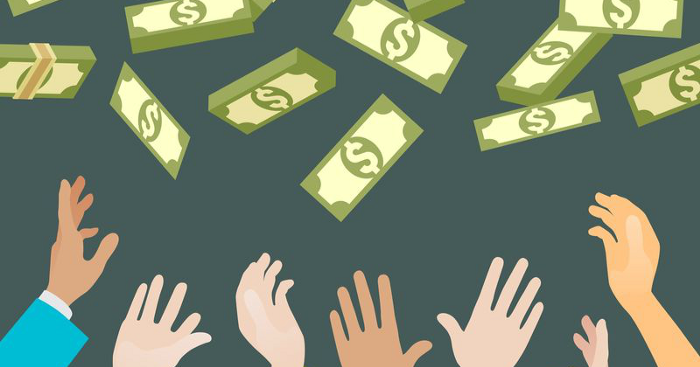Like Health care, College, UBI, and COVID relief
When Rep. Alexandria Ocasio-Cortez (AOC) demanded that Congress pay people to stay home during Corona virus shutdowns, Nikki Haley, former governor of South Carolina, tweeted:
“AOC, Are you suggesting you want to pay people to stay home from the money you take by defunding the police? Or was that for the student debts you wanted to pay off, the Green New Deal or Medicare for All? #WhereIsTheMoney”
Where is the money? What about the deficit? What about inflation? Conservatives always ask those questions to dismiss demands for needed programs like COVID relief pay, universal basic income (UBI,) free public college, and Medicare for all.
But don’t answer them. Those are trick questions. Conservative ideology opposes populist reforms, as they opposed Social Security, Medicare, food stamps, unemployment compensation, and many other plans to help working-class people.
Opponents can’t publicly admit to opposing those things, so they in public that programs are unaffordable. ‘We don’t have the money,’ they say, and even if we did, spending it might cause runaway inflation. They say government budgets should be balanced; all expenses need to be paid for with taxes, or else money will lose its value and prices will soar.
The world’s richest investment companies, such as Black Rock and Goldman Sachs have been warning loudly about such inflation for years, even while demanding and receiving government bail outs for themselves and their corporate clients. But these arguments are wrong, contradicted by 100 years’ experience and by new research; and it’s worth learning why. So, let’s go over their objections. Where WILL the money come from?
Money cannot run out
Money is not a real thing that exists in the physical world, like oil or water. It’s a social agreement invented to make it easier to exchange things. Economist/futurist Hazel Henderson says that money is not wealth itself; it is only a way of measuring it.
Wealth consists of real things like food, labor energy, manufactured goods, natural resources, inventions: things that people want and are willing to give something for. When current Federal Reserve chair Jerome Powell was asked on CBS-TV ‘Where is the money going to come from,’ to pay for Corona virus relief, Powell responded that they would just print it, digitally and as banknotes.
The Fed knows they can create all the money they want with a few key strokes. They’ve been doing it for decades to keep stock markets up, to pay for bank bailouts and military buildups, among other programs. Banks also create money when they give loans. A loan for a house or an oil pipeline doesn’t come from anywhere; the bank just adds it to the loan recipient’s account.
Leading Modern Monetary Theory (MMT) economist Stephanie Kelton PhD, author of The Deficit Myth (2019), explains that national governments that can print their own currency can never run out of money. For a country to run out of money would be like Play Store running out of an app.
Oligarchs and their propagandists warn that money will lose its value if we give people too much. If too much money is chasing too few goods, they argue, we’ll wind up paying $1000 for a quart of milk. These inflation warnings sound plausible, and such “hyperinflation” has, in fact occurred in poor countries. But when we look more closely, we can see that in the current world environment of high productivity, mass unemployment and falling wages, inflation is only a story used to frighten us.
Inflation is not a threat
What is inflation and what causes it? Investopedia defines inflation as “decline of purchasing power of a given currency over time.” Inflation is not just a rise in certain prices; prices can go up for many reasons. Inflation is a loss in a currency’s value, a loss in public confidence in a government’s money, affecting all prices. What makes this happen?
The traditional answer is that inflation comes from too much government spending. In this theory, government deficits lead to an excess of money, which then loses its value. But this explanation is greatly over-simplified and often just wrong.
According to Stephanie Kelton, a depression economy is not normally a time of inflation. Prices can still rise for reasons such as shrinking supplies or hoarding, but the national currency is not in danger.
Inflation happens when the total amount of money in circulation far exceeds the goods and services available to buy, according to MMT. You can see inflation right now in the stock market, where trillions in government bailout dollars chase too few productive investments, sending stock prices through the roof, while the economy collapses.

But in the real world of goods and services, as long as a country has sufficient productive capacity and wealth (things to sell,) their money will not lose its value. The USA has tremendous productive capacity right now, so, according to MMT, virtually no risk of severe inflation. Some prices might rise slightly, but this is not necessarily a bad thing. If everyone was receiving $2000/month in UBI payments, and prices went up 10% as a result, the vast majority of people would be far better off.
Modest inflation is a much bigger problem for rich than for poor, for employers than for workers. Matthew Yglesias wrote on Slate.com that, “Historically, the populist political position was generally pro-inflation. Inflation squeezes creditors–bankers and rich people–and helps debtors–less-rich people.”
Hyperinflation hurts almost everybody but, along with the MMT reasons I have already given, the USA has another, almost unbreakable barrier protecting its currency. By treaties, the dollar is the only currency in which to buy and sell oil internationally. So, demand for dollars will never drop as long as the “petrodollar” rules remain in effect. And those rules are backed up by the US military, which has overthrown governments like Qaddafi’s Libya, Hussein’s Iraq, and threatened Venezuela when they considered trading oil in other currencies. I’m not saying this is a good thing, but it’s very real.
Countries without such a super-currency also could spend more money if they have productive capacity to back it up. Many countries are paying workers to stay home in Corona virus shutdowns and have not experienced inflation as a result. According to Dr. Kelton, each country has to evaluate how much money they should have in circulation, based on their own capacity, but no country need be afraid of running a deficit in their budget. Deficits won’t sink a currency’s value.
Deficit reduction is a con game
Without getting too partisan about this, Republicans’ calling for fiscal restraint and warning about deficits is a blatant con game. They don’t apply those rules to themselves.
When Bill Clinton became President in 1993, he and Vice-President Gore started the National Partnership for Reinventing Government, with the goal of making federal bureaucracies more efficient and less costly. NPRG worked so well that massive federal deficits disappeared. Helped by an economic boom time, national budgets were balanced from 1998–2001. Whether or not that was a good thing, it was what Republicans always say they support.
But when George W. Bush became President in 2001, he immediately blew up the budget with huge tax cuts for the wealthy and massive increases in military spending. This is the bait-and-switch Republicans do; Ronald Reagan did the same thing in 1981; President Trump in 2017.
Conservatives scream about deficits to stop things like COVID relief and UBI, but they create huge deficits with their own spending and tax cuts. As economics journalist Dylan Matthews wrote on Vox.com “The rational move for liberals in such a game is to stop cooperating and declare that you’re not going to pay for anything either.”
Because we don’t need to. The trillions in bailouts to corporations since 2008 prove that money can be used however a society (or its rulers) want to use it. MMT provides the theory as to how to make money work for us. Let’s go.
Key takeaways
> Money isn’t wealth: it’s just a representation of wealth, a way of keeping score. Since governments create money, they cannot run out of it.
> The US economy can well afford adequate relief for COVID shutdowns. We can afford a UBI, health care for all, infrastructure repair, and free college. More importantly, we can afford to focus on environmental restoration and stopping global warming.
> If a society keeps producing wealth, its money will not lose value. Major inflation will not happen if an economy has valuable things to sell. Minor inflation is not a problem for anyone except credit card companies and banks.
> Focus on deficit reduction and inflation is a bait-and-switch con game. The people who promote them don’t apply it to themselves.
> Call your representatives to demand COVID relief to individuals, cities, and states.
— — — — — — — —
Thanks for reading! Follow me on Twitter, on Facebook or on Medium.com. Hire me for freelancing, editing, or tutoring on Linked In


Mahalo nui!
For me, the hidden gem of this piece is the “petrodollar.” Seems as long as global dominance (aka fear/ego) is tied to oil, there will be strong resistance to needed reduction in oil dependence. Still excited by how many Americans and global citizens are pushing hard enough to create needed waves of change. As you said, “let’s go”!
The petro dollar is at stake in the sanctions war on Russia. Russia and China are gambling they’re big enough to pull this off. Finally. How long will productive economies like China and Japan finance the debt of the US military that is aimed directly at them? Others who have challenged the petrodollar, like Moammar Khadfy and Saddam Hussein have not fared well.